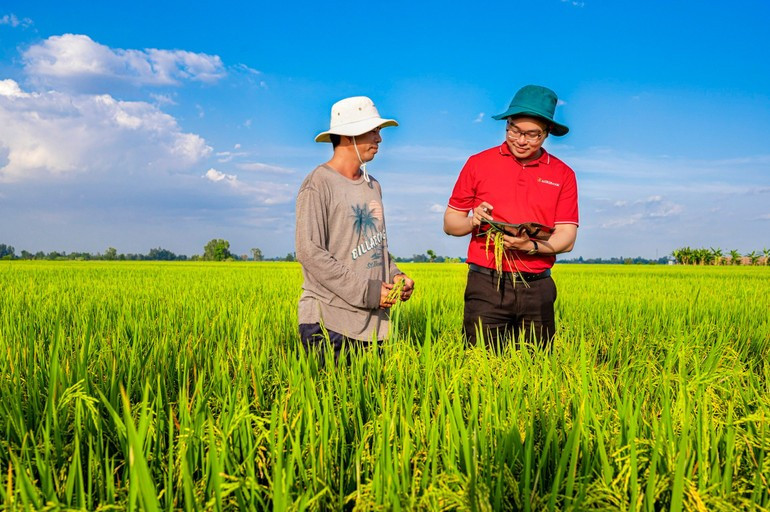Efforts made to support development of private economy
The private economic sector, with nearly 1 million enterprises and over 5 million business households, is the sector that contributes up to 50% of the country’s GDP, more than 30% of the total budget revenue and employs 82% of the total workforce. Supporting and promoting the development of the private economic sector is a major orientation, as affirmed in Resolution No. 68-NQ/TW.

Escaping poverty with a “barrier-breaking” loan
Nga Hai Cooperative, the first unit in Ha Tinh Province to apply Israeli technology in cultivation. At that time, in 1993, the cultivated land of the cooperative members was still just uncultivated wasteland. The orientation of the cooperative was to produce high-value agricultural products, using advanced Israeli science and technology models referenced from farms in Thailand. However, the capital for land reclamation, technology transfer and hiring experts from Israel was a difficult problem. At that time, the leader of Nga Hai Cooperative, Le Van Binh, went to the Nghi Xuan Agribank branch to borrow 100 million VND.
He recalled: “At that time, Nguyen Sy Han, Director of Agribank’s Nghi Xuan Branch, directly came to appraise the site. When he came to the farm, which was then just a wild land, overgrown with reeds, Han was both impressed and troubled. I know that the branch held many meetings afterwards, and finally decided to “break the barrier” to approve a 100 million VND unsecured loan because they needed breakthrough people to build their homeland.”
According to Binh’s memory, at that time the money that the cooperative disbursed was mainly in denominations of 5,000 VND, filling 2 large sacks. With the first 100 million VND borrowed from Agribank, Nga Hai Cooperative has continuously succeeded in applying high technology to agricultural production. And over the past 32 years, the production and business activities of this enterprise have always been accompanied by Agribank.
“Currently, my family still has a debt of 7 billion VND at Agribank. For decades, the cooperative has only had a credit relationship with Agribank, because this is the bank that understands farmers the most, wants farmers to get rich, and also accepts risks with farmers,” Binh confided.
Supporting the private economy: A requirement of the entire political system
In the process of economic integration and development, the private economic sector has increasingly affirmed its role as one of the important driving forces to promote growth, create jobs and make a large contribution to the state budget. Today, the private economy has become an essential pillar, contributing nearly 50% of GDP, creating 82% of jobs in the economy and making an important contribution to export turnover as well as developing new industries, especially in the fields of technology, services, and innovation.
In that role, on May 4, 2025, General Secretary To Lam signed and issued Resolution No. 68-NQ/TW on “Continuing to innovate mechanisms and policies to strongly develop the private economy, truly becoming an important driving force of the socialist-oriented market economy.” Resolution 68 affirms the important role of the private economy in the economy. The resolution clearly states that after 40 years of innovation, the country’s private economy has gradually developed in both quantity and quality, becoming one of the important driving forces of the socialist-oriented market economy.
This is an important milestone demonstrating the high political determination of the Party and state in removing barriers, creating a favourable, transparent and fair investment and business environment for the private sector to develop effectively and sustainably. The resolution not only determines policy orientations but also sets out specific requirements for the political system, authorities at all levels and the banking and financial system, including the important role of commercial banks in the next activities for private economic development.
Loan support: practical plans
With decades of experience accompanying the agricultural sector, Agribank is seen as a bank that understands production and business activities in this field and has close connections with agricultural enterprises and farmers. On that basis, this bank has actively developed a series of preferential credit programs to support the development of the private economy.
According to Phung Thi Binh, Deputy General Director of Agribank, the bank’s total outstanding loans currently reach over 1.7 quadrillion VND, more than 60% of which is allocated to the agricultural, rural, and farmer sectors — the main customer group is private economic households. Specifically, there is nearly 500 trillion VND worth of outstanding loans to legal customers, up to 90% of which belong to private enterprises.
In 2024, this bank has developed 20 preferential credit programs, most of which are aimed at customers in the private economic sector. According to the State Bank’s plan, Agribank has been allocated a growth rate of 13% in 2025, equivalent to about VND230,000 billion to be put into circulation. Of this capital, Agribank has determined that it will mainly lend to customers in the private economic sector.
Assessing Agribank’s credit sources in private credit, Dr. Tran Khac Tam, Vice President of the Viet Nam Association for Consumer Goods Development - VACOD, said that Agribank is one of the largest commercial banks in Viet Nam, with a wide network and a focus on serving agriculture and rural areas. In fact, Agribank is the bank with the largest lending rate in rural areas, mainly to individuals, households, and small businesses.
This is the private sector that accounts for a large proportion of Viet Nam’s rural economy. Next is the work of hunger eradication and poverty reduction. Through preferential lending programs (policies under the direction of the government), Agribank has helped people access capital more easily to escape poverty and develop the economy.








